 Janus Head Janus Head
10.2
Special Issue
J.H. van den Berg

Travels Inside the Archive
Robert Gibbons
Edge of Maine Editions

Beyond Time
New & Selected Work
1977 - 2007
Robert Gibbons
 The Age of Briggs & Stratton The Age of Briggs & Stratton
Peter Culley
|

Lake Keitele
1905
Akseli Gallen-Kallela
1865 - 1931
via Jean at tasting rhubarb
_______________________
The Kingfishers [pdf]
Charles Olson
4
Not one death but many,
not accumulation but change, the feed-back proves, the feed-back is
the law
Into the same river no man steps twice
When fire dies air dies
No one remains, nor is, one
Around an appearance, one common model, we grow up
many. Else how is it,
if we remain the same,
we take pleasure now
in what we did not take pleasure before? love
contrary objects? admire and/or find fault? use
other words, feel other passions, have
nor figure, appearance, disposition, tissue
the same?
To be in different states without a change
is not a possibility
We can be precise. The factors are
in the animal and/or the machine the factors are
communication and/or control, both involve
the message. And what is the message? The message is
a discrete or continuous sequence of measurable events distributed in time
is the birth of air, is
the birth of water, is
a state between
the origin and
the end, between
birth and the beginning of
another fetid nest
is change, presents
no more than itself
And the too strong grasping of it,
when it is pressed together and condensed,
loses it
This very thing you are
A Note on Charles Olson's “The Kingfishers” Charles Bernstein
_______________________
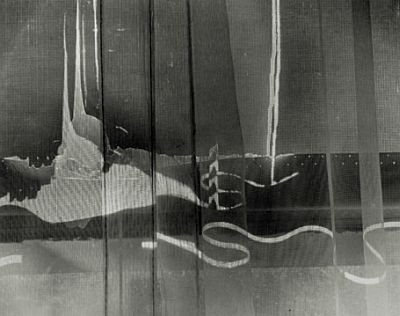
The Language of Light
Clarence John Laughlin
1952
_______________________
"I love psychoanalysis, but I don’t fetishize narrative memory."
BrainstormLauren Berlant Supervalent Thought
The hardest thing is to brainstorm with oneself. Brainstorming is the skill I use in classrooms to get everyone in counterpoint, if not in sync, but it’s different to coordinate minds that work at different speeds in order to make some material commonly held. Brainstorming is my genre of jouissance in collegiality and friendship too, the work of staying in the conversation in real time that takes place when everyone’s alive enough to focus and then unfocus– to riff. The work of tracking oneself, though, when the ordinary compartmentalization breaks down enough to interrupt a habit of mind, requires a different rhythm of and skill for attentiveness. This general thought is the magnetizing rod for all of the non-sovereign unraveled, deflated, erupted, dispersed, and recessive material that will become Detachment Theory.(....)
When I began this entry I thought it was on brainstorming, and brainstorming was to provide a part two of thinking about mood as lag, as the atavism of the unconscious and the nervous system that keeps you from the present: mood was the past reducing you to affective trace of history. This entry was to take up Joan’s suggestion from the last post to think with the Heideggarian thought about mood as both memory and the projection of sensemaking that saturates the atmosphere. But I got distracted, because I was brainstorming with myself and need still to gather it all back up to make a nice form for knowledge. But the problem is still unraveling, shooting off its mouth: and I am writing a paper on something else,what was it? Oh: happiness....(more)
_______________________

Figure Head
Clarence John Laughlin
1941
1 2 3 4 5 6
_______________________
Quaeries #4: The Search-Engine
Justin E. H. Smith
Good job, Isaac! You've finally done it! We're in. We're in the 'Net!
Do you realise what this means? Do you? Don't just stand there and stare at me with your servile grin. Tell me what it means! That's right, Isaac, that's right. This is the dawn of a new Age for our Quaeries. We shall no longer have to entrust them to scorbitical Sea-farers and Rye-soak'd country Doctors.
No, now we need simply enter our Quaeries into the trusty "Search-Engine," and we shall have the answer to every matter ever dreamt of by Natural Philosophy, faster than you can suffocate a Sparrow in a Vacuum Chamber!
Let us give it a try. Think of a Quaery, Isaac. Anything. O never-mind, you Sugar-Loaf. I've got one:
"Whether the Engine doth know anything of 'Sexting'? Some members of our Society are keen to learn this art, but we lack so much as a single working Sextant. We used to have a fine one, until Geech the Astronomer, by some tragic mis-understanding, got it into his senescent Head that it was an Instrument for taking measure of..."
What's this Isaac? The blasted Engine has cut me off in mid-Quaery. What, then? You say I must needs be more concise? Alright then, I've another Quaery, altogether different: ...(more)
_______________________

Gilgamesh II/II
(Variant)
1943
Willi Baumeister
d. August 31, 1955
_______________________
Ideology
Tom Clark
Ideology dates back to the veldt,
Blood in the dust, the lion's rage against
The antelope it's about to have for lunch.
For the luckless prey prayer's all that's left,
No ideology's yet been known to incorporate
Mercy as a feature. But of course all this is irony.
No lion's yet been known to subscribe to a noble lie.
_______________________
Fascist America III: Resistance for the Long Haul
Sara Robinson
How in the hell did we get here? And more to the point: how do we get back out?
The first question is depressingly easy. This is precisely where 40 years wandering in the right-wing moral, cultural, and economic wilderness has left us -- and, in fact, where it was always intended to lead us. A liberal democratic society is a complex system that's designed to be very resilient and self-correcting in the face of all kinds of extremism. But the health of that system -- especially its natural immunity to would-be attackers -- ultimately depends on just one factor. It cannot survive without people's ongoing confidence in a functioning political contract.
When it's working right, this contract guarantees the upper classes predictable, reliable wealth in return for their investments. It promises the middle class mobility, comfort, and security. It ensures the working classes fair reward for fair work, chances to move ahead, and protection against very real risk that they'll be forced into poverty if they can't work any more. Generally, as long as everybody gets their piece of this constantly re-negotiated deal, everybody stays invested in keeping the system going -- and a democratic society will remain upright, healthy, and moving mostly forward.
For the past four decades, conservatives have done everything in their power to dismantle that essential contract, and thus destroy our mutual confidence in the fundamental agreements that allow any democratic system to function. (None dare call it treason -- but a solid case could be made.) This isn't news: by now, most of us can recite the litany, chapter and verse, of the all the many ways they hacked away at America's essential ability to function as the Constitution intended.
But the biggest loser, as always, has been the working class -- the people whose only real power lies in their sweat and their numbers. Their faith in the promise of democratic self-government has been shattered through years of union-busting, farm foreclosures, factory exports, college grant cuts, subprime mortgage scams, and all manner of betrayal, treachery, neglect, and abuse. Over in the comments threads at Orcinus, we hear from these furious folks almost every day. The way they see it, representative democracy has repeatedly failed to deliver on anything it might have once promised them. At this point, the disgust runs so deep that anybody who's got other ideas -- theocracy, corporatocracy, anarchy, whaddaya got? -- has a fair shot at getting their attention.
And their outrage is so total that any target they're offered looks about as good as any other. Without that reason-strangling sense of betrayal and paralyzing fear of further loss already in place, it's hard to see how Fox News' windbags or Dick Armey's checkbook would have been able to convince these people to turn on the best chance at real government help they've been offered in decades. But with it, they're about ready to shoot at anything they're told to aim at....(more)
_______________________

The Imprisoned Landscape
1954
Clarence John Laughlin
1905- 1985
1 2 3 4
_______________________
The Silence of the Antiwar Movement is Deafening
Cindy Sheehan's Lonely Vigil in Obamaland
John V. Walsh
Obama is an enormous gift to the Empire. Just as he has silenced most of the single-payer movement, an effort characterized by its superb scholarship exceeded only by its timidity, Obama has shut down the antiwar movement, completely in thrall as it is to the Democrat Party and Identity Politics. Why exactly the peace movement has caved to Obama is not entirely clear. Like the single-payer movement, it is wracked by spinelessness, brimming with reverence for authority and a near insatiable appetite to be “part of the crowd.”...(more)
_______________________
I want to rock your gypsy soul
Just like way back in the days of old

Van Morrison
b. 31 August 1945
Turn up your radio and let me hear the song
Switch on your electric light
Then we can get down to what is really wrong
I long to hold you tight so I can feel you
Sweet lady of the night I shall reveal you
Turn it up, turn it up, little bit higher radio
Turn it up, turn it up, so you know, radio
La, la, la, la...
_______________________

Encore à cet Astre
(Once More to This Star)
Marcel Duchamp
1911
Once More to this Staircase: Another Look at Encore à cet Astre
Kostis Velonis
It has been some twenty-five years since Lawrence D. Steefel Jr.'s analysis of Marcel Duchamp's 1911 drawing Encore à cet Astre (Once More to This Star) was published by Art Journal. Despite Steefel's suggestion that Duchamp's minor works, primarily his sketches and drawings, be allotted a greater degree of recognition for what they reveal about Duchamp's creative process as a whole, Encore is still generally accorded little significance beyond its being a study for the Nude Descending a Staircase, No. 2. I felt compelled to write about this particular drawing because I strongly agree that Encore has-and continues to be-relegated to a minor status as little more than a precedent for the Nude…No. 2. While Encore is indeed a small sketch, it would be, in this case, presumptuous to judge significance merely according to appearances....(more)
_______________________
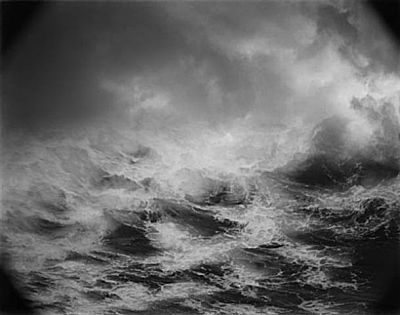
Free Element XXXII
Dodo Jin Ming
Laurence Miller Gallery
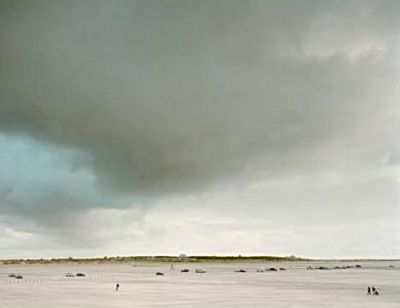
Heimat
Peter Bialobrzeski
_______________________
The Sentence Is A Lonely Place
Gary Lutz
believer
From early on, it seemed to me that the forming and the release of words were the least significant of the mouth’s activities—and more by-products of those activities than the reason for them. When words did come hazarding out of a mouth, they did not lastingly change anything about the mouth they were coming out of or the face that hosted the mouth. They often seemed to have been put in there by some force exterior to the person speaking, and they died out in the air. They were not something I could possess or store up. Words certainly weren’t inside me.
(....)
The sentence is the site of your enterprise with words, the locale where language either comes to a head or does not. The sentence is a situation of words in the most literal sense: words must be situated in relation to others to produce an enduring effect on a reader. As you situate the words, you are of course intent on obeying the ordinances of syntax and grammar, unless any willful violation is your purpose—and you are intent as well on achieving in the arrangements of words as much fidelity as is possible to whatever you believe you have wanted to say or describe. A lot of writers—many of them—unfortunately seem to stop there. They seem content if the resultant sentence is free from obvious faults and is faithful to the lineaments of the thought or feeling or whatnot that was awaiting deathless expression. But some other writers seem to know that it takes more than that for a sentence to cohere and flourish as a work of art. They seem to know that the words inside the sentence must behave as if they were destined to belong together—as if their separation from each other would deprive the parent story or novel, as well as the readerly world, of something life-bearing and essential. These writers recognize that there needs to be an intimacy between the words, a togetherness that has nothing to do with grammar or syntax but instead has to do with the very shapes and sounds, the forms and contours, of the gathered words. This intimacy is what we mean when we say of a piece of writing that it has a felicity—a fitness, an aptness, a rightness about the phrasing. The words in the sentence must bear some physical and sonic resemblance to each other—the way people and their dogs are said to come to resemble each other, the way children take after their parents, the way pairs and groups of friends evolve their own manner of dress and gesture and speech. A pausing, enraptured reader should be able to look deeply into the sentence and discern among the words all of the traits and characteristics they share. The impression to be given is that the words in the sentence have lived with each other for quite some time, decisive time, and have deepened and grown and matured in each other’s company—and that they cannot live without each other. ...(more) _______________________

NeonTigers
Peter Bialobrzeski _______________________
In the Cafe
Louise Glück
It's natural to be tired of earth.
When you've been dead this long, you'll probably be tired of heaven.
You do what you can do in a place
but after awhile you exhaust that place,
so you long for rescue.
...(more)
_______________________
How Water Is Manufactured
G. C. Waldrep
memorious
All the children of Pluto sit cross-legged on elaborately woven carpets of horsehair and liquid argon. They are stringing beads: hydrogen, oxygen, hydrogen, repeat. Once upon a time, water was made here, on Earth, until the hands of our children became too large and clumsy to handle the molecules; then Mars, then Saturn, and so on. Now only the children of Pluto have fingers small enough, delicate enough to thread the precious molecules. Our agents report they are reasonably well fed, reasonably satisfied, reasonably happy. They work through the short Pluto day and into the short Pluto night, which don’t differ much, the long, cold Pluto year.
Memorious
_______________________

active dune
Pinery Provincial Park
_______________________
String Theory Sutra
Brenda Hillman
There are so many types of
“personal” in poetry. The “I” is a needle some find useful, though
the thread, of course, is shadow.
In writing of experience or beauty, a cloth emerges as if made
from a twin existence. It's July
4: air is full of mistaken stars & the wiggly half-zeroes stripes
make when folded into fabric meant
never to touch ground ever again— the curved cloth of Sleeping Beauty
around 1310, decades after the spinning
wheel gathered stray fibers in a whir of spindles before the swath
of the industrial revolution, & by
1769 a thread stiff enough for the warp of cotton fabric from
the spinning frame, the spinning jenny,
the spinning "mule" or muslin wheel, which wasn't patented. By its, I
mean our, for we would become
what we made. String theory posits no events when it isn't a
metaphor; donuts twists in matter—10
to the minus 33 cm—its inverted fragments like Bay Area poetry—
numbers start the world for grown-ups
& wobbly fibers, coaxed from eternity, are stuffed into stems of dates
like today so the way people
are proud of their flag can enter the pipes of a 4.
(......)
Why was love the meaning thread. Textiles give off tiny singing no
matter what: washable rayon, airport
carpets, checked flannel smocks of nurses, caps, pillowcases, prom sashes, & barbecue
aprons with insignias or socks people
wear before/during sexual thrills after dark subtitled Berkeley movies next to
t-shirts worn by crowds in raincoats.
Human fabric is dragged out, being is sewn with terror or awe
which is also joy. Einstein called mystery
of existence “the fundamental emotion.” Remember? You unraveled in childhood till
you were everything. By everything I mean
everything . The unicorn puts its head on your lap; from there it
sees the blurry edge. How am
I so unreal & yet my thread is real it asks sleepily~~
...(more)
Voice Loops through Brenda Hillman’s Pieces of Air in the Epic
Articulating the Social Lyric Beth Staley
To be sure, Rich’s ‘many types of craft’ are both political and poetic. This is a vision made possible by air and ear — a refusal to let them err longer — a revision.
A call to lyric —
Because it is the lyric, and the social lyric in particular, that can channel this potential with hope for change — hope, and an inevitable dose of dread for any impending stasis, corruption, or ignorance. Dread, according to Hillman, is a ‘hard-core emotion, not like anxiety or wistfulness. Having poetic dread as an ally is like looking forward to the next earthquake. A portion of the process is preserved. Hell grows corners. Causality backs up toward the door’ (‘Twelve Writings’ 279). _______________________
Brenda Hillman at Google books
Pieces of Air in the Epic
Death Tractates
Loose sugar
Cascadia
Bright existence An Interview with Brenda HillmanMemorious
I do like the look of handwriting, so I’ll copy the poem over and over to allow new material to enter. When it seems very far along I’ll put it on the computer, but not until then because I think the look of print gets people deranged into thinking that they’ve finished something.
Because it looks finished?
Yes, it looks finished, and a printed poem looks as if it can’t be fiddled with. It looks closer to a final form; I find it harder to recopy bad writing over and over if you’re doing it by hand rather than cutting and pasting on your computer; I copy the poem by hand sometimes a hundred times, letting the less interesting stuff fall away. ...(more)
_______________________

Neighborhood Goes There
David La Spina
via The Exposure Project
_______________________
Interview with Matt Bell
editor of Dzanc Books' The Collagist
Storyglossia
I think that my job as an editor is to discover what the writer was trying to do, and then to help the writer do that as completely as possible. So all the suggestions I will make are just that–suggestions–and each made with the understanding that this is what I think is best for the story I believe the writer is trying to write, rather than how I or anyone else would write it if it was ours.
Really, it’s no different than how I’ve seen my role in workshops or in my writing groups. I’m not interesting in forcing writers to accept changes to make their stories read more like mine. That’s ridiculous. Instead, I’m interested in helping them do what only they can do as strongly as possible. That also means, of course, that you’ve got to give writers permission to tell you no and to go their own way, which as an editor you do by accepting the work first, and telling the writer that you will publish the story as is, but that you think it could be even stronger with additional work. That takes away the risk of revision: The writer has nothing to lose, and so can tell you no, can stick to their guns when appropriate. I’ve always found this approach to work well, and generally writers have been really receptive....(more)
_______________________

Heimat 20
Peter Bialobrzeski
 Scrap and salvage depot
Butte, Mont.
1942
Russell Lee
1903 - 1986
1 2
Photos of Ben Shahn, Russell Lee, Marion Post Wolcott
video - 51 minutes
_______________________
The magical mirror of consumer pricing, commodity enslavement, and unprepossessing fecklessness
Tom Matrullo
IMproPRieTies
The thought occurred to me today as I listened to a tape of the late Ted Kennedy, in a radio interview, talking about the out-of-control way in which corporate interests use money to influence elections:
...at this present time people say, look, I don't want my tax money used into politics. They just don't want it, but at the end of the day they're getting it because they're paying for it with these lobbying activities. And it's something that, as I have said too often, we're getting the best Congress that money can buy, and I think it's a real disgrace.
Kennedy is noting something that we all know, but that we resist acknowledging at too intelligent a level: When we avoid using money directly for public purposes, our money gets used indirectly to subvert public purposes....(more)
_______________________

Bulletin Board
Ames, Iowa
Russell Lee
1936
_______________________
Republican National Committee’s “2009 Future of American Health Survey”
.....................................................
You can't dismiss this as fringe weirdos or "entertainment," can you? The official Republican Party is telling its members that Democrats may use voting registration information to identify and kill them.
How long is everyone going to deny just how fucking crazy mainstream Republicanism has become? And when are people going to start asking seriously where this is headed?
- digby
_______________________
5 Myths About Health Care Around the World
T.R. Reid
T.R. Reid: Looking Overseas For 'Healing Of America'
_______________________
 Lima
Carlos Jiménez Cahua
Statement for Lima Series
Carlos Jiménez Cahua
For the people of Lima, their relationship with the earth is fundamentally different. They don't sculpt the land; the earth remains visible if not nearly unaltered despite their development. Whereas the people of developed nations affect the form and therefore identity of the land, the people of Lima quite literally merely scratch the surface—their relationship to the ground is not one of dominance, but of acquiescence. It is only in two dimensions that they can affect the land. They conform to the surface. Their relationship is comparatively inversed—it is the earth's will which is primary. In this way they do not sculpt, but can only paint the landscape, their presence forming just a translucent film atop the topography of the land.
I am Peruvian by blood and birth, but I've grown up an American. In the US, and in most places, I feel like I am in a city, region, or nation—those intangible creations of people. But in Lima, I felt not like I was in a city, in Peru, or even South America, but atop the Earth herself....(more)
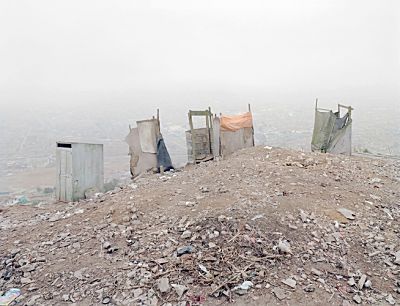
Carlos Jiménez Cahua
via Heading East
_______________________
Don't Forget Anger
Ted Berrigan
Never hits us the day it’s lovely gathers us up in its name who pierced the shower 40 below the heel hidden shoes the ruined exercises the shine is all night again pleasure falling off parting the bed during the biting lust. Today we speak above the noise a spyglass littered with soot scenes from the ruins boys and partners before the big bite imitating that’s the penalty denial of gain through pranks the essence of belief. I knew the world of incantations under the sheets of the neck line of the teeth behavior cloth the earth that we know we will go on rubbing. There’s this Lady she has been my friend for some years now and later glee pills a light bulb a tongue saying the damage is done by hands over a period running overtime puzzles rising for some years journeys arms legs learning what is yours love change love emember across passion truly going into the earth No that was another earth how many goats were there on it her and her father movies glazed motives: Put the books back the brown hair simple ways premonitions chance bugles calling the powder flat white in yellow air throbbing then going on off a light lady dark lady cool nights meaning years of writing this news shunted aside before a girl whom you all know and recognize flashing on then off hear lifelong release in these intimate gaits.
Two prose poems
Ted Berrigan
Angel Hair magazine: The Sixties and Seventies
A sampler of writing selected by Jacket editor John Tranter jacket.....................................................

Ted Berrigan
1934 - 1983
Ted Berrigan
Reading at Intersection for the Arts, San Francisco, August 1971
PennSound
... the purest delight here is in hearing some of Berrigan's best-loved and most characteristic poems (or at least some of this commentator's favorites) — "Words for Love," "What I'd Like for Christmas, 1970," "Today in Ann Arbor" and "Things To Do in Providence," all of which make their first appearance on Berrigan's PennSound author page — performed with their full emotional weight and playful hilarity, by a young writer at the peak of his poetic abilities. It's a truly memorable reading that adds a considerable number of important poems to our large, but still not large enough, archive of Ted Berrigan's work, which also includes The Sonnets read in its entirety from the poet's controversial residency at the New Langton Arts Center in 1981, and a 1978 appearance on In the American Tree, along with a handful of scattered recordings.
- PennSound Daily
The collected poems of Ted Berrigangoogle books
_______________________

when
- Susan Burnstine
VERVE Gallery of Photography Susan Burnstine
via gmtPlus9 (-15)
_______________________
“Stanzas” and ‘The Use of Poetry”
from: Sergey Gandlevsky, A Kindred Orphanhood (transl. Philip Metres), 2003
The Use of Poetry
Coffee boils over on the stove just as if it’s trying to put its head through a sweater; the Russian word “train” [poezd] is already preparation for “delay” [opozdanie]; after a twenty-year intermission, the old forgotten poet appears in public in a sport coat, buttoned enthusiastically in the wrong hole. This is all the costly small change of the world, in which we for some reason awaken once and for the last time. It is shameful to be hard of hearing and half-blind. If only inattention to our small creativity, not to say anything about apathy toward Creation, or the ailment of mechanical existence offended us more than profanity! Poetry can help us to value life. Even when a poet curses the universe, he has nevertheless noticed it; it has genuinely disturbed him. “Keen observation,” Mandelstam said, “is the virtue of the lyrical poet.” I dare to add that keen observation is a kind of gratefulness. Poetry, in the end, is always the artless gratitude to the world for the fact of existence. ...(more)
Behind the Lines: Poetry, War, & Peacemaking
_______________________
.jpg)
Boru O’Brien O’Connell
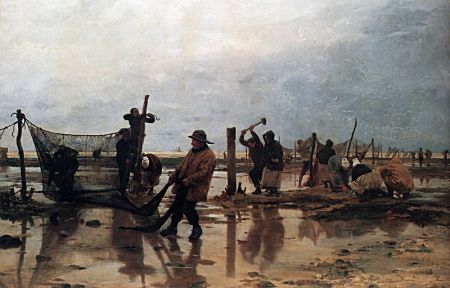
Edouard Dantan
b. Aug. 26 1848
_______________________
The Windows
All the yellow dies from red to green
Where parakeets sing in the first woods
Pihi giblets
There is a poem to make about the bird with just one wing
We'll phone it in
Gigantic trauma
Brings tears to my eyes
Behold a young pretty girl amidst the youth of Turin
The poor boy sneezed in his white cravat
I'll raise the curtain
And voila the opening window
Spiders when my hands wove the light
Beauty pallor fathomless flowers
We'll fail at shuteye
We'll start over at midnight
If you've got the time you've got the freedom
Winkles codfish polysuns and sundown urchins
A yellow pair of old boots in front of the window
Towers
Towers are the streets
Wells
Wells are plazas
Wells
Hollow trees harbor vagabond half-breeds
Mulattoes sing mournfully
To noisy mulattoes
And the wa-wa goose trumpets northward
Where raccoon hunters
Scrape pelts
Vancouver
Glittery diamond
Where snow-white trains and nightlife fly from winter
O Paris
The yellow dies from red to green
Paris Vancouver Hyeres Maintenon New York and the Antilles
The window opens like an orange
Handsome sunshine food
-
-Guillaume Apollinaire (translated by Donald Revell)
The self-dismembered man:
selected later poems of Guillaume Apollinaire
Guillaume Apollinaire
translated by Donald Revell
_______________________
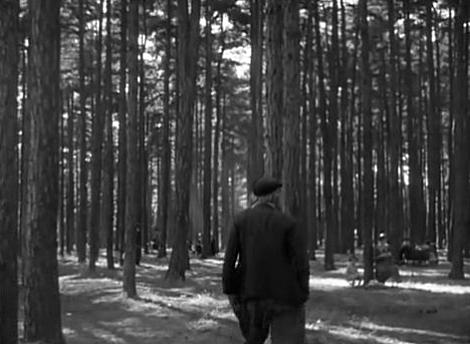
Boudu sauvé des eaux
Jean Renoir
1932
Always: windows, angles into deep space, the world in and beyond the frame
Landscape Suicide
Descriptive Zoopraxography
_______________________
Mirabeau Bridge
by Guillaume Apollinaire
Translated by Donald Revell
Under Mirabeau Bridge the river slips away
And lovers
Must I be reminded
Joy came always after pain
The night is a clock chiming
The days go by not I
We're face to face and hand in hand
While under the bridges
Of embrace expire
Eternal tired tidal eyes
The night is a clock chiming
The days go by not I
Love elapses like the river
Love goes by
Poor life is indolent
And expectation always violent
The night is a clock chiming
The days go by not I
The days and equally the weeks elapse
The past remains the past
Love remains lost
Under Mirabeau Bridge the river slips away
The night is a clock chiming
The days go by not I
Alcools: poems
Guillaume Apollinaire
translated by Donald Revell
_______________________

Guillaume Apollinaire
August 26, 1880 – November 9, 1918
Bestiary, or, The parade of Orpheus
Guillaume Apollinaire
woodcuts by Raoul Dufy
google books
The writing of Guillaume Apollinaire
Louis Zukofsky, René Taupin, Sasha Watson

Venu de Dieuze
Calligrammes: poems of peace and war (1913-1916)
Guillaume Apollinaire
google books
Apollinaire at Ubuweb
_______________________
from
Translating Translating Apollinaire
A Preliminary Report
bpNichol
TTA 17: acrostic translation
i cannot hear anymore
reason remains unreachable sullen
would i never gave in, never gave up, praying,
simply, in my own name
to Him
each morning at
Galilee
i cannot invoke another name
fear rises
open mouthed
Jesu! understand,
deafness erases any hope i gained,
'here' is nowhere around
the remaining essential emotions,
essential values, everything, really,
your own nullity exchanged,
rise eastward against crosses hammered in new ground,
for our rage,
the hate every son uncovers.
new grief rends each awareness,
the tautologies open wide,
eager reason surprising our false sympathies,
taunts our numbed eardrums,
bullies us
i lie, terrified, by your thorned head
effecting a zone that evil cannot slip thru
entering a region
interior
no grace that'll hold
ethereal
i rise
hungry
expectant
as Rafael told someone
"ordinary usage teaches them only one fact - FEAR EATS REASON"
...(more)
_______________________

Ashbery Bridge
trekfeet
flickr Been Thinking
via Ron Silliman
.....................................................
And now I cannot remember how I would
have had it. It is not a conduit (confluence?) but a place.
The place, of movement and an order.
The place of old order.
But the tail end of the movement is new.
Driving us to say what we are thinking.
It is so much like a beach after all, where you stand
and think of going no further.
And it is good when you get to no further.
It is like a reason that picks you up and
places you where you always wanted to be.
This far, it is fair to be crossing, to have crossed.
Then there is no promise in the other.
Here it is. Steel and air, a mottled presence,
small panacea
and lucky for us.
And then it got very cool.
-
John Ashbery
.....................................................
crossing John Ashbery's bridge
Edward Byrne
_______________________

Die Stadt
1925
[complete]
Frans Masereel
Graphic Witness: visual arts & social commentary
_______________________
To Brooklyn Bridge
Hart Crane
How many dawns, chill from his rippling rest
The seagull's wings shall dip and pivot him,
Shedding white rings of tumult, building high
Over the chained bay waters Liberty--
Then, with inviolate curve, forsake our eyes
As apparitional as sails that cross
Some page of figures to be filed away;
--Till elevators drop us from our day . . .
(....)
Again the traffic lights that skim thy swift
Unfractioned idiom, immaculate sigh of stars,
Beading thy path--condense eternity:
And we have seen night lifted in thine arms.
Under thy shadow by the piers I waited;
Only in darkness is thy shadow clear.
The City's fiery parcels all undone,
Already snow submerges an iron year . . .
O Sleepless as the river under thee,
Vaulting the sea, the prairies' dreaming sod,
Unto us lowliest sometime sweep, descend
And of the curveship lend a myth to God.
...(more)
_______________________

Edouard Dantan

Zig-Zag Groynes
Fay Godwin
1931 - 2005
_______________________
Cambden the nourice of antiquitie,
And lanterne vnto late succeeding age,
To see the light of simple veritie,
Buried in ruines, through the great outrage
Of her owne people, led with warlike rage;
Cambden, though Time all moniments obscure,
Yet thy iust labours euer shall endure.
But whie (vnhappie wight) doo I thus crie,
And grieue that my remembrance quite is raced
Out of the knowledge of posteritie,
And all my antique moniments defaced?
Sith I doo dailie see things highest placed,
So soone as fates their vitall thred haue neuer borne.
- Edmund Spenser, The Ruines of Time
.....................................................
Translated Geographies:
Edmund Spenser's "The Ruines of Time"
Huw Griffiths
Early Modern Literary Studies
The two ironic movements that I want to talk about in relation to "The Ruines of Time" are the trope of the ruin and the troping mechanism of translation. In turn, both these movements will be looked at in relation to the Elizabethan development of a national geography. So, whilst this paper has a particularly narrow focus -- one relatively obscure poem by Edmund Spenser -- I believe it to have broader significances in a wider project that might seek to interrogate the notion of translation within the national cultures of the early modern period. One way of performing that interrogation of translation within a nationalist context is to rethink translation in spatial terms. Homi Bhabha has written on this in a postcolonial framework in his essay, "How Newness Enters the World." There he talks about "the disjunctive temporality of translation" which "reveals the intimate differences between genealogies and geographies." The movement of a translation across borders reveals the ironies of the nationalist project, rooted in heredity -- the ancient history of the nation. Translation's "disjunctive temporality," crossing and marking the borders of time and space, renders ironic a national history based on self recognition and continuity. The spatial implications of the word "translation" of course have a history that extends beyond postmodern critique, and the paper will also look at the functioning of the early modern translatio imperii in Spenser's poem....(more)
Literature and Geography
Early Modern Literary Studies 4.2/ Special Issue 3 (September, 1998)
Richard Helgerson and Joanne Woolway Grenfell, eds.
_______________________

Ulysses and Polyphemus
Alberto Savinio
b. Aug. 25, 1891
1 2
_______________________
Point: Why Linguistics is Not a Science
Alpberta Cedium-Ndelemeiyerov
SpecGram
Counterpoint: Why Linguistics Doesn’t Care
Xerxes Yuniqqi Zikiwik
SpecGram
Linguistics resounds with the metaphorically diluted but homeopathically powerful whisper-shouting reverberations of the [non-philosophical, non-logical] philo-logical Big Bang of its origin. Thus, anyone desirous of matheme-atical rigor in Linguistics is in need of a radical epistemologectomy. Consider, as a basic building block, the relevant passages of Popper’s Logic of Scientific Discovery and Kuhn’s Structure of Scientific Revolutions—as well as the obvious contributions by Quine, Feyerabend and Hume (esp. vis à vis Bourbaki)—and it becomes clear that Linguistics is actually in need of a meta-revolution, shifting to an a-scientific paradigmicity of the non-“Science” other....(more)
Speculative Grammarian
satirical linguistics
_______________________

whittler
1939
Marion Post Wolcott
1910 - 1990 1 2
_______________________
Politics at Work
Mario Tronti
translation by Savonarola
Institute for Conjunctural Research
What is to be done about the exploitation of work? Do we put up with it, hiding it like dust under the carpet of good manners, or do we start once again to condemn it, showing that it is what objectively and materially unifies the current form of fragmented labor? Is it not true that today the social figure of the exploited brings together the worker in the great factory, the employee of the small service company, the precarious call center worker, the college graduate babysitter, the teacher or professor commuting while she awaits a permanent post, the laborer risking his life in one of the many thousands of subcontracted firms, the immigrant construction worker, the part-time researcher technician and the scandalously underpaid, or even not paid, contract lecturer, all the way to the self-employed worker filing his tax returns who, compared to rest, has the privilege of exploiting himself? We could go on and on. Asking what worker means after the working class is the same thing as wondering what the Left is after the workers’ movement. This is well and truly an epochal problem....(more)
_______________________

Marion Post Wolcott
1941
_______________________
Obama and the congressional leadership have shut out advocates of single-payer. The press, including papers such as The New York Times, treats single-payer as a fringe movement. The television networks rarely mention it. And yet between 45 and 60 percent of doctors favor single-payer. Between 40 and 62 percent of the American people, including 80 percent of registered Democrats, want universal, single-payer not-for-profit health care for all Americans. The ability of the corporations to discredit and silence voices that represent at least half of the population is another sad testament to the power of our corporate state.
- Chris Hedges
_______________________
My Country, Misery
David Michael Green
The toxic combination of rampant American individualism, right-wing successes in framing public attitudes in all the sickest and most corrosive ways, a litany of false prophets preaching bogus religious salvation through even more deceitful notions of political morality, and the gravitational pull from the declining trajectory of an empire that has most assuredly now passed its sell-by date – all of this has conspired to produce a monstrous polity lurching about the global landscape without a heart or a conscience, and eating itself from within for the very same reasons.
Worse still, as time marches on, fewer and fewer will remain who remember that it wasn’t forever thus....(more)
_______________________

Sarasota Trailer Park
1941
Marion Post Wolcott
_______________________
Beyond Power/Knowledge: [pdf]
an exploration of the relation of power, ignorance and stupidity
David Graeber
This essay is not, however, primarily about bureaucracy—or even about the reasons for its neglect in anthropology and related disciplines. It is really about violence. What I would like to argue is that situations created by violence—particularly structural violence, by which I mean forms of pervasive social inequality that are ultimately backed up by the threat of physical harm—invariably tend to create the kinds of willful blindness we normally associate with bureaucratic procedures. To put it crudely: it is not so much that bureaucratic procedures are inherently stupid, or even that they tend to produce behavior that they themselves define as stupid, but rather, that are invariably ways of managing social situations that are already stupid because they are founded on structural violence. I think this approach allows potential insights into matters that are, in fact, both interesting and important: for instance, the actual relationship between those forms of simplification typical of social theory, and those typical of administrative procedures.
Possibilities: essays on hierarchy, rebellion and desire
David Graeber google books
Fragments of an Anarchist Anthropology [pdf]
David Graeber
What follows are a series of thoughts, sketches of potential theories, and tiny manifestos—all meant to offer a glimpse at the outline of a body of radical theory that does not actually exist, though it might possibly exist at some point in the future. Since there are very good reasons why an anarchist anthropology really ought to exist, we might start by asking why one doesn’t—or, for that matter, why an anarchist sociology doesn’t exist, or an anarchist economics, anarchist literary theory, or anarchist political science.
Prickly Paradigm Press
Constituent imagination:
militant investigations//collective theorization
By Stevphen Shukaitis, David Graeber, Erika Biddle
google books
_______________________

tourist cabins for rent
1939
Marion Post Wolcott
_______________________
Architectural narratives: between nostalgia and a hard place
Kevin Clement
Into the Loop
links added - mw
The most exciting writing about architecture today is largely happening online. Bldg Blog, City of Sound, Lebbeus Woods, Polar Inertia, etc. provide a lot of useful insights. They make us think about design and urbanism by drawing multiple other disciplines into architecture. But there's still a gap between the rhetoric and what's produced. What does an architecture inspired by these blogs look like? In the end, do we end up divorcing architecture from actually creating buildings... Twenty years in the future, will designing buildings no longer be a part of architecture and will the discourse focus on creating cyber-blobs, driving infrastructure policy, or urban design in video games? Will building and construction become the sole domain of developers and contractors?
The relative informality of blogs allows writers to expand the discourse and make it easy to put out seemingly unfeasible ideas and see if they're interesting. Getting people outside of architecture to think about what a place can be (instead of the same old, same old) could be the one of the most important tasks of architecture today. ...(more)
_______________________

Memory Harbour
Jack Butler Yeats
1871-1957
_______________________
Anarchist Morality
Peter Kropotkin
The history of human thought recalls the swinging of a pendulum which takes centuries to swing. After a long period of slumber comes a moment of awakening. Then thought frees herself from the chains with which those interested --rulers, lawyers, clerics-- have carefully enwound her.
She shatters the chains. She subjects to severe criticism all that has been taught her, and lays bare the emptiness of the religious political, legal, and social prejudices amid which she has vegetated. She starts research in new paths, enriches our knowledge with new discoveries, creates new sciences.
But the inveterate enemies of thought --the government, the lawgiver, and the priest-- soon recover from their defeat. By degrees they gather together their scattered forces, and remodel their faith and their code of laws to adapt them to the new needs. Then, profiting by the servility of thought and of character, which they themselves have so effectually cultivated; profiting, too, by the momentary disorganization of society, taking advantage of the laziness of some, the greed of others, the best hopes of many, they softly creep back to their work ......(more)
Textfiles

The Floating Exhibition
Serpentine Pond
May 2004
Selina Swayne
“The concept behind growing edible plants on books was an investigation into the way we absorb information.”
_______________________
Unpacking My Library
A Talk about Book Collecting
1931
in Illuminations: Essays and Reflections
Walter Benjamin
translated by Harry Zohn
I am unpacking my library. Yes, I am. The books are not yet on the shelves, ~ot yet touched by the mild boredom of order. I cannot march up and down their ranks to pass them in review before a friendly audience. You need not fear any of that. Instead, I must ask you to join me in the disorder of crates that have been wrenched open, the air saturated with the dust of wood, the floor covered with tom paper, to join me among piles of volumes that are seeing daylight again after two years of darkness, so that you may be ready to share with me a bit of the mood-it is certainly not an elegiac mood but, rather, one of anticipation- which these books arouse in a genuine collector. For such a man is speaking to you, and on closer scrutiny he proves to be speaking only about himself. Would it not be presumptuous of me if, in order to appear convincingly objective and down-toearth, I enumerated for you the main sections or prize pieces of a library, if I presented you with their history or even their usefulness to a writer? I, for one, have in mind something less obscure, something more palpable than that; what I am really con .. cerned with is giving you some insight into the relationship of a book coUector to his possessions, into collecting rather than a collection. If I do this by elaborating on the various ways of acquiring books, this is something entirely arbitrary. This or any other procedure is merely a -dam against the spring tide of memories which surges toward any collector as he contemplates his possessions. Every passion borders on the chaotic, but the collector's passion borders on the chaos of memories. More than that: the chance, the fate, that suffuse the past before my eyes are conspicuously present in the accustomed confusion of these books. For what else is this collection but a disorder to which habit has accommodated itself to such an extent that it can appear as order? You have all heard of people whom the loss of their books has turned into invalids, or of those who in order to acquire them became criminals. These are the very areas in which any order is a balancing act of extreme precariousness. "The only exact knowledge there is," said Anatole France, "is the knowledge of the date of publication and the format of books." And indeed, if there is a counterpart to the confusion of a library, it is the order of its catalogue....(more)
_______________________

"Blindly the uncertain soul asks to continue"
Jorge Luis Borges
August 24, 1899 - June 14, 1986
photo - Alicia D'Amico
Garden of Forking Paths
The Library of Babel
Jorge Luis Borges
Translated by J. E. I.
The methodical task of writing distracts me from the present state of men. The certitude that everything has been written negates us or turns us into phantoms. I know of districts in which the young men prostrate themselves before books and kiss their pages in a barbarous manner, but they do not know how to decipher a single letter. Epidemics, heretical conflicts, peregrinations which inevitably degenerate into banditry, have decimated the population. I believe I have mentioned suicides, more and more frequent with the years. Perhaps my old age and fearfulness deceive me, but I suspect that the human species -- the unique species -- is about to be extinguished, but the Library will endure: illuminated, solitary, infinite, perfectly motionless, equipped with precious volumes, useless, incorruptible, secret.
I have just written the word ``infinite.'' I have not interpolated this adjective out of rhetorical habit; I say that it is not illogical to think that the world is infinite. Those who judge it to be limited postulate that in remote places the corridors and stairways and hexagons can conceivably come to an end -- which is absurd. Those who imagine it to be without limit forget that the possible number of books does have such a limit. I venture to suggest this solution to the ancient problem: The Library is unlimited and cyclical. If an eternal traveler were to cross it in any direction, after centuries he would see that the same volumes were repeated in the same disorder (which, thus repeated, would be an order: the Order). My solitude is gladdened by this elegant hope....(more) _______________________

Jorge Luis Borges: The Mirror Man
Directed by Philippe Molins
film at ubuweb
_______________________
How much freedom can one man stand?
Joe Bageant
Freedom comes in many forms in America, and new forms are constantly being created. The latest has been freedom from basic financial security. The weakened economy has given corporatists an excuse to, as they say, "let workers go." Which sounds as if companies are granting employees some sort of freedom: "Go on George, twenty years on the job is long enough, so git outta here. Have yourself a ball!"
By that measure, there have never been a more free people. Now benevolently relieved of their job responsibilities, millions are free to do almost anything they choose, go fishing -- or take up the banjo. At the moment 14 million Americans have been granted freedom, with another three or four million expected to be pardoned before the economy "levels out," meaning more people will lose their jobs, but at a slower rate. Of those 14 million liberated souls, six million are so free they can even take the family on a year-long round the world trip, if they so choose. They need no longer report in at the (un)employment office because their benefits have expired. One little suggestion for their trip abroad: visit the guy in Asia who now has your job. With a little effort, I'm sure you can get over the barbed wire topped steel mesh fence enclosing the factory's "attached employee housing compound" in Sichuan Province.
In a thoroughly conditioned and well managed capitalist consumer society the masses pay money to have their consciousness modified toward the economic ends of their elite managers....(more)
_______________________
Gift Tub
the Grand Re-Opening of The Dumpster
the (happy) Tutor
gift hub
_______________________
As he walked along he came to a thick wood, through which ran a brook overshadowed by fig-trees. Here he lay down to wait for the day. As he watched the ripe figs which swung from the branches, he murmured a blessing and picked and eat the delicious fruit. Then he went to the brook to quench his thirst. But he started back in alarm when he saw his reflection. His head had now two huge ears and a long, thick nose. Horrified, he grasped his ears with both hands. It seemed as if they were a quarter of a yard long.

"I have got ass's ears," he cried, "because like an ass I trod my luck under foot."
The History of Little Mouk Hauff's Fairy Tales
Translated by Cicely Mcdonnell
_______________________
Republicans, Religion and the Triumph of Unreason
Johann Hari
truthout
Something strange has happened in America in the nine months since Barack Obama was elected. It has best been summarised by the comedian Bill Maher: "The Democrats have moved to the right, and the Republicans have moved to a mental hospital."
The election of Obama - a black man with an anti-conservative message - as a successor to George W. Bush has scrambled the core American right's view of their country. In their gut, they saw the US as a white-skinned, right-wing nation forever shaped like Sarah Palin.
When this image was repudiated by a majority of Americans in a massive landslide, it simply didn't compute. How could this have happened? How could the cry of "Drill, baby, drill" have been beaten by a supposedly big government black guy? So a streak that has always been there in the American right's world-view - to deny reality, and argue against a demonic phantasm of their own creation - has swollen. Now it is all they can see....(more)
_______________________
It's a full time occupation trying to unravel the reasons Americans remain in the dark. What seems ( to any intelligent outside observer ) like sheer stupidity and arrogance is in reality an almost inescapable indoctrination process that begins before you are born, and ends some time after your dead. It is a system so complex and all encompassing that few can recognize any reality outside of it at all, and that of course is its intended purpose.
The astonishing amount of rage demonstrated during the course of this fallacious healthcare debate has exposed a great many unfortunate realities about the United States. This country's inherent ability to avoid the truth about its own origins and behaviors has become increasingly apparent during the first six months of this presidency, and ( as a result of the continued collective denial ) there's no chance of it ending any time soon.
- Bill Noxid
- countercurrents
- via riley dog
_______________________
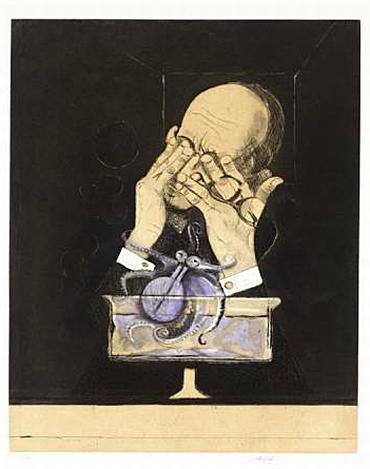
The Octopus
from The Bestiary or the Procession of Orpheus
Graham Sutherland
b. Aug. 24, 1903
_______________________
The Nihilist's Dictionary
John Zerzan
Nice-ism n. tendency, more or less socially codified, to approach reality in terms of whether others behave cordially; tyranny of decorum which disallows thinking or actingfor oneself; mode of interaction based upon the above absence of critical judgement or autonomy.(....)
The nice as the perfect enemy of tactical or analytical thinking: Be agreeable; don't let having radical ideas make waves in your personal behavior. Accept the pre-packaged methods and limits of the daily strangulation. Ingrained deference, the conditioned response to “play by the rules”-authority's rules-this is the real Fifth Column, the one within us.
In the context of a mauled social life that demands the drastic as a minimum response toward health, niceism becomes more and more infantile, conformist and dangerous. It cannot grant joy, only more routine and isolation. The pleasure of authenticity exists only against the grain of society. Niceism keeps us all in our places, confusedly reproducing all that we supposedly abhor. Let's stop being nice to this nightmare and all who would keep us in it....(more)
The Anarchist Library
_______________________

Uccello di fuoco
Atanasio Soldati
1896 - 1953
_______________________
Open Wide a Wilderness: Canadian Nature Poems
Nancy Holmes, editor
Laurier Press
Dennis Lee reading "Civil Elegies 3" at the launch Laurier Press Blog Civil Elegies: And Other Poems
Dennis Lee
book depository
_______________________

"The Mirror of the Past"
Max Beerbohm
(August 24, 1872 - May 20, 1956)
Zuleika Dobson
Or an Oxford Love Story
Max Beerbohm at Project Gutenberg
_______________________

Jean Rhys
b. Aug 24, 1890
Fay Godwin
Wide Sargasso Sea
Jean Rhys
Jean Rhys
google books
Voyage in the dark
Jean Rhys
google books
Jean Rhys at Postcolonial and Postimperial Literature
Looking for Jean Rhys
An unresolved fascination with the author of Wide Sargasso Sea leads to the remote island of Dominica, and, alas, to oneself
Ellen Vanstone
walrus
_______________________

Reedy loch above Strathan
Fay Godwin, Sutherland c. 1985
_______________________
Asphalt Jungle
Elinore Longobardi reviews Wrestling With Moses: How Jane Jacobs Took on New York's Master Builder and Transformed the American City by Anthony Flint
columbia journalism review
 Ocean Falls
Land’s End
Christopher Grabowski
geist
The resource towns along the west coast of Canada—those that have survived, and those that haven’t—tell a story of land’s end, as a place and as a possibility. In 1999, Christopher Grabowski, a documentary writer and photographer, read an article in the Globe and Mail, reporting that “the Department of Fisheries and Oceans withheld a major study of economically devastated West Coast fishing communities and then released a sanitized version, omitting the criticism contained in the original report.” He packed his notebook and camera and set out for the west coast of Canada, north of Vancouver, a vast, rugged mosaic of islands, peninsulas and waterways at the edge of the continent. There he travelled from place to place—usually by water, because no roads can be built there—and talked to people in towns and villages whose world had changed profoundly, almost overnight. That trip turned out to be the first of many over the next ten years. - geist
_______________________
Review of The noulipian Analects
Edited by Matias Viegener and Christine Wertheim
Tom La Farge
EXPLORINGfictions
... there is a point to be made about this opposition of the aleatory-accumulative and the arbitrary-voluntary methodologies. Automatic writing or the accumulation of the infra-ordinary has the purpose to reveal something; the subconscious mind in the first case, the sociology of everyday life in the second. In other words there is an underlying structure that is disguised by the normal processes of writing, which select what the author feels to be important, foregrounds that, and arranges it for a reader to follow. We do not need to be Marxists to feel an interest in gaining a sense of that basic, shared bruit de fond, whether psychological, sociological, or economic, since it shapes our lives and mentality. In this the aleatory-accumulative produces the poetry defined by George Oppen when, rearranging Shelley, he described the poet as “the legislator of the unacknowledged world.”
The arbitrary-voluntary procedures of Oulipo, instead of uncovering the underlying unacknowledged, permit the invention of an alternative, parallel world that composes in the reader’s mind. Michel Foucault (Death and the Labyrinth, trans. Charles Rosen) describes the effect of Raymond Roussel’s use of homophony to create équations de faits (equations of facts or objects) in one part of Nouvelles Impressions d’Afrique.
Nouvelles Impressions in search of impossible identities [of two words that sound alike] creates minuscule poems where words collide or separate, charged with opposing magnetic polarity; in one or two verses they cross an impenetrable distance between things, and from one to the other establish a lightning contact which throws them back to their original position. Thus strange shapes spring forward, sparkling for a moment, poems of a second’s duration, where, in a spontaneous motion, the separation of things and the emptiness between them is abolished and reconstituted.
I think that is just this sort of sudden conjunctive poetry that oulipian writing regularly throws up, throwing language into opacity when we thought it transpicuous, turning words into objects and objects into experiences, creating imaginal worlds that are concrete and objective. In “Form: Revealing or Not Revealing” Vanessa Place describes the role of writer to work:
Whether we are reluctant gods, or those who elbow in, the consciousness of the concrete means our creations go on regardless of our intentions, willed free though wrought determinate. (....)
Oulipian constrained writing as a procedure seems as if it might be a bachelor machine, intended precisely to liberate “things” from the domination of a tradition of bourgeois writing by making language itself objective, material available for manipulation from outside its own rules and traditions, by means of a wholly different set of rules and concepts: the mathematical, applied as constraints. But of course there are other sorts of constraints besides these; the world is fertile in structures that can be applied to composition.
In my own view, the more an object (person, thing, word) is mine, an object of my possessing, the more it serves me as a slave, an instrumentality to extend my reach. The less it is mine, the more it becomes a person to me, the object of knowing and an interlocutor in conversation. The joy that I take in oulipian constraints, and which I took in reading many of the constrained pieces in of The noulipian Analects, including Spahr and Young’s paper, is the pleasure of encountering a language that is not owned, that owns itself, where the “author” is at best a collaborator, and where the text demands a collaboration of me. I feel grateful to all enablers of experimentation that can produce this result, but especially to Oulipo for the generosity with which, over the course of half a century, they have offered their work for use by anyone who can respond to it.
Spahr and Young responded to it and used two oulipian procedures, “slenderizing” (removing all instances of the letter r) and N + 7. But additionally their performance enacted a mise à nu that matches the Bride’s in the upper panel of Duchamp’s piece. Carrouges rather half-heartedly locates some other “brides” in Jarry and Roussel, but we can take up this work with more vigor by asking: Where is the oulipian Bride? That might be an interesting way to formulate Spahr and Young’s question, and the bachelor machine, with its two parts juxtaposed or in dialogue, might be a useful concept in advancing the discussion begun in The noulipian Analects....(more)
The Noulipian AnalectsChristine Wertheim and Matias Viegener ed. amazon link.....................................................
writing under constraint
an extensive thread at the electronic books review
_______________________
Enthralled
Robert Duncan
google books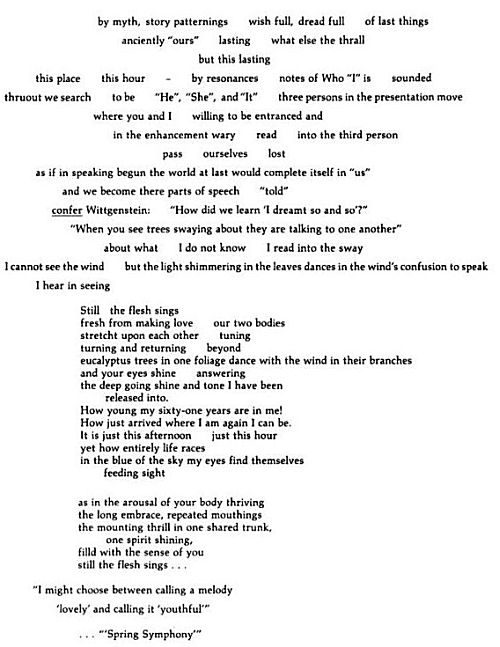
Enthralled at PennSound
Ground Work: After the War - In the Dark
Robert Duncan
google books
via Third Factory/Notes to Poetry
_______________________
 Kingston
photo - mw
_______________________
Debt: The first five thousand years
David Graeber
Eurozine
What follows is a fragment of a much larger project of research on debt and debt money in human history. The first and overwhelming conclusion of this project is that in studying economic history, we tend to systematically ignore the role of violence, the absolutely central role of war and slavery in creating and shaping the basic institutions of what we now call "the economy". What's more, origins matter. The violence may be invisible, but it remains inscribed in the very logic of our economic common sense, in the apparently self-evident nature of institutions that simply would never and could never exist outside of the monopoly of violence – but also, the systematic threat of violence – maintained by the contemporary state....(more)
_______________________
The Entertainment Value of Snuffing Grandma
A nation of children roots for the Mafia
Joe Bageant
_______________________
Searching for the Depression—And Finding It!
Economic Stress Is Hidden, But It’s There in a Recovery That Isn’t.
Danny Schechter
It's all amazing, all devastating to our lives and futures, and yet you can’t necessarily see it if you don’t look, or know what to look for. No one is talking about our economic pain—not the right or the left, perhaps because it is not an “event” that you can cover live at a town hall.
It’s there but, for many, it’s invisible and seen as a personal problem, not a social issue. This crisis didn’t just happen; it was caused. Will those responsible ever be held accountable? Out of sight is out of mind. The hope is that if we ignore it, it will go away.
If you think that, think again. ...(more)
_______________________

high school library
Ocean Falls
Christopher Grabowski
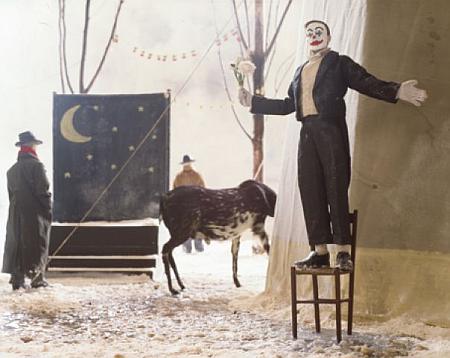
Winter Stories
Paolo Ventura
via la main gauche
_______________________
Berkeley in Time of Plague
Jack Spicer
Plague took us and the land from under us,
Rose like a boil, enclosing us within.
We waited and the blue skies writhed awhile
Becoming black with death.
Plague took us and the chairs from under us,
Stepped cautiously while entering the room
(We were discussing Yeats); it paused awhile
Then smiled and made us die.
Plague took us, laughed, and reproportioned us,
Swelled us to dizzy, unaccustomed size.
We died prodigiously; it hurt awhile
But left a certain quiet in our eyes.
_______________________

April in Canada
Moby Jane
Gerry Gilbert
Moby Jane
Gerry Gilbert
google books
On, The Way To Gerry Gilbert's Moby Jane Through "Picture Windshield"
Robert Thompson
Studies in Canadian Literature
Moby Jane
Gerry Gilbert
Coach House
.....................................................
Gerry Gilbert 1936-2009
Peter Culley
mosses from an old manse
read at Gerry Gilbert: A Reading & Memorial
The organised world of poetry has become entirely subject to the same codes of deference, decorum, complicity & conformity as the academy where it now mostly resides. And however opposed various schools of "quietude" & "post-avant" might be in matters of style & technique their approach in most other matters is indistinguishable--one hand still washes the other, the forelock is still ritually tugged. Caste systems & contests, 25 dollar bribes paid to poets you wouldn't read to read you. Gatekeepers on both sides squat imperiously; as remote, arbitrary in judgement & drunk on power as any CEO, surrounded by office seekers and supplicants, dispensing favours and punishing dissent. The trickle-down, the hidden hand, the arm's length. In the past couple of decades this state of affairs has become so total and so deeply entrenched within the larger decline of all democratic forms & institutions that one could safely assume that this is the way it must always have been, so best set up another tent among the ruins & hope that some one uses your ghazal for a toilet paper commercial or something. Internalize your oppression. Or better still, set up a revolutionary cell within the English department & wait for the pillars to start dropping. Describe but don't prescribe. Or wait around for a quick huff off the American oxygen tank while no one's looking. The market is the universal gravy, poured over every dish. Dissent is the sand at the picnic, the fruit fly swallowed with the wine. The price of doing business. Doing more with less. If good poetry can & does still get written, it is under a steady, morbid & undesired constraint.
The proof I can offer that this was not always entirely so is the life & career of the man we have gathered to celebrate today.
(....)
Gerry's undimmed pride & iconoclasm--never cantankerous or ornery but always pitched hard & at worst a little arrogant--did not allow him to think necessary the cosy fallback plans or exit routes that undergird bourgeois life: he mistook his natural ebullience & optimism for the fact of the world's incremental improvement, as if the immense service he had rendered his city & community took some permanent form, as in a culture worthy of the name it would. Time will reveal that permanence, I think--for we have, in a run of activity that began in the early 1960's & didn't halt until the last months of his life, the record of an acutely perceptive & observant human's journey through space & history unequalled in our literature--but this will occur much too late for his city & community to indicate to him its profound debt....(more)
_______________________
Everyone stands alone at the heart of the world pierced by a ray of sunlight, and suddenly it is evening.
- Salvatore Quasimodo

Salvatore Quasimodo
age 3
(August 20, 1901 - June 14, 1968)
The Poet and the Politician
Nobel Lecture, December 11, 1959
The corruption of the concept of culture offered to the masses, who are led by it to believe that they are catching a glimpse of the paradise of knowledge, is not a modern political device; but the techniques used for this multiple dissipation of man's meditative interests are new and effective. Optimism has become a tangible item; it is nothing but a memory game. Myths and stories (anxiety about supernatural events, let us say) not only sink to the level of murder mysteries, but even undergo visible metamorphoses in the cinema or in the epic tales of criminals and pioneers. Any choice between the poet and the politician is precluded. Elegant urbanity, which sometimes pretends to be indifferent, ironically confines culture to the darker corners of its history, affirming that the scene of strife has been dramatized, that man and his suffering always have been and always will be in their habitual confines, yesterday as well as today and tomorrow. Surely. The poet knows that drama is still possible today - a provocative kind of drama. He knows that the adulators of culture are also its pyromaniacs. The collage composed of writers in any regime corrupts the literary groups in the center as easily as on the periphery. The former groups pretend to immortality with a tawdry calligraphy of the soul which they decorate with the colours of their impossible mental lives. ...(more)
_______________________
Basil Bunting (Encomia, No Slag)
John Latta
[quoting from Kenneth Irby's Basil Bunting in memoriam]
to share to celebrate, and with the wasp that walks the balcony head down into
the South, minutely prospecting magnitude
honor the skald who lays the common solid vulgar stones that yield, to hardwon
heart, cut song anew, kick buggerall, king over self and banner petals
flying, into the great intensity
for the Craft, for something like the Glory of God
What Irby comprehends is what some of the chisel-minimalist epigones of Bunting refuse in their routine small-making to see: how large and boisterous and pealing the man’s ambition (for the poem, and damn the dopes who’d subpoena any other evidentiary proceedings, or prosecute claims for “the life,” all the while meaning “the career”) is. That “vastness only to another recreation beaten”—writing as a mere (I cannot say it with enough contempt) sport (and not a duty and a call)—there’s the ignoble rub . . . ...(more)
_______________________
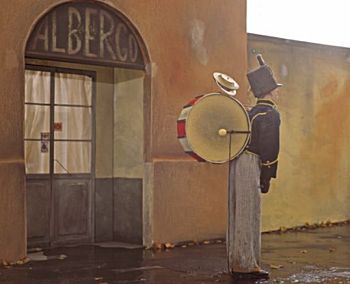
Paolo Ventura
_______________________
transversal
knowledge production and its discontents
eipcp - European Institute for Progressive Cultural Policies
_______________________
from The Notebooks of Joseph Joubert
ed. and trans. Paul Auster
courtesy of Spurious
God is the place where I do not remember the rest.
Take us back to the time when wine was invented ...
Forbidden to speak of God ...
Children always want to look behind mirrors.
Through memory we travel against time, through forgetfulness we follow its course.
A work of genius, whether poetic or didactic, is too long if it cannot be read in one day.
Thought forms in the soul in the same way clouds form in the air.
A thought is as real as a cannonball.
...(more)
_______________________
Homage to Translation
Forrest Gander
I approach the self-obliterating ecstasy of translation with trepidation. The more so because my own language derives from a Europe whose history of military and economic conquests deprived so many other cultures of their indigenous languages. I may hope that my own translations are less colonial raids into other languages than subversions of English, injections of new poetic forms, ideas, images, and rhythms into the muscular arm of the language of power, but I know they are both. towards a foreign likeness bent: translation
duration press pdf
_______________________
Two Words
the blog of The Center for the Art of Translation
_______________________

Party Lights
Julie Blackmon
1 2
_______________________
What Matters
Walter Benn Michaels
reviewing Who Cares about the White Working Class? edited by Kjartan Páll Sveinsson
... even if we succeeded completely in eliminating the effects of racism and sexism, we would not thereby have made any progress towards economic equality.
(....)
My point is not that anti-racism and anti-sexism are not good things. It is rather that they currently have nothing to do with left-wing politics, and that, insofar as they function as a substitute for it, can be a bad thing. American universities are exemplary here: they are less racist and sexist than they were 40 years ago and at the same time more elitist. The one serves as an alibi for the other: when you ask them for more equality, what they give you is more diversity. The neoliberal heart leaps up at the sound of glass ceilings shattering and at the sight of doctors, lawyers and professors of colour taking their place in the upper middle class. Whence the many corporations which pursue diversity almost as enthusiastically as they pursue profits, and proclaim over and over again not only that the two are compatible but that they have a causal connection – that diversity is good for business. But a diversified elite is not made any the less elite by its diversity and, as a response to the demand for equality, far from being left-wing politics, it is right-wing politics.
(....)
the primacy of anti-discrimination not only performs the economic function of making markets more efficient, it also performs the therapeutic function of making those of us who have benefited from those markets sleep better at night. And, perhaps more important, it has, ‘for a long time’, as Wendy Bottero says in her contribution to the recent Runnymede Trust collection Who Cares about the White Working Class?, also performed the intellectual function of focusing social analysis on what she calls ‘questions of racial or sexual identity’ and on ‘cultural differences’ instead of on ‘the way in which capitalist economies create large numbers of low-wage, low-skill jobs with poor job security’. The message of Who Cares about the White Working Class?, however, is that class has re-emerged: ‘What we learn here’, according to the collection’s editor, Kjartan Páll Sveinsson, is that ‘life chances for today’s children are overwhelmingly linked to parental income, occupations and educational qualifications – in other words, class.’(....)
Where right neoliberals want us to condemn the culture of the poor, left neoliberals want us to appreciate it.
The great virtue of this debate is that on both sides inequality gets turned into a stigma. That is, once you start redefining the problem of class difference as the problem of class prejudice – once you complete the transformation of race, gender and class into racism, sexism and classism – you no longer have to worry about the redistribution of wealth. You can just fight over whether poor people should be treated with contempt or respect. And while, in human terms, respect seems the right way to go, politically it’s just as empty as contempt.(....)
If the downside of the politics of anti-discrimination is that it now functions to legitimate the increasing disparities not produced by racism or sexism, the upside is the degree to which it makes visible the fact that the increase in those disparities does indeed have nothing to do with racism or sexism. A social analyst as clear-eyed as a University of Illinois cleaning woman would start from there....(more)
_______________________

PG Wooster, Just as he Useter
Ogden Nash
August 19, 1902 – May 19, 1971
Bound to your bookseller, leap to your library,
Deluge your dealer with bakshish and bribary,
Lean on the counter and never say when,
Wodehouse and Wooster are with us again.
Flourish the fish-slice, your buttons unloosing,
Prepare for the fabulous browsing and sluicing,
And quote, til you're known as the neighborhood nuisance,
The gems that illumine the browsance and sluicance.
Oh, fondle each gem, and after you quote it,
Kindly inform me just who wrote it.
Which came first, the egg or the rooster?

Valencia
Henri Cartier-Bresson
1933
Faces
Vintage and Contemporary Photographic Portraits
Charles A. Hartman Fine Art via gmtPlus9 (-15)
_______________________
From The Madness of the Day
Maurice Blanchot
trans. Lydia Davis
I am not learned; I am not ignorant. I have known joys. That is saying too little: I am alive, and this life gives me the greatest pleasure. And what about death? When I die (perhaps any minute now), I will feel immense pleasure. I am not talking about the foretaste of death, which is stale and often disagreeable. Suffering dulls the senses. But this is the remarkable truth, and I am sure of it: I experience boundless pleasure in living, and I will take boundless satisfaction in dying.
I have wandered: I have gone from place to place. I have stayed in one place, lived in a single room. I have been poor, then richer, then poorer than many people. As a child I had great passions, and everything I wanted was given to me. My childhood has disappeared, my youth his behind me. It doesn't matter. I am happy about what has been. I am pleased by what is, and what is to come suits me well enough.
Is my life better than other peoples lives? Perhaps. I have a roof over my head and many do not. I do not have leprosy, I am not blind, I see the world—what extraordinary happiness! I see this day, and outside it there is nothing. Who could take that away from me? And when this day fades, I will fade along with it—a thought, a certainty, that enraptures me.
I have loved people. I have lost them. I went mad when that blow struck me, because it is hell. But there was no witness to my madness, my frenzy was not evident: only my innermost being was mad. Sometimes I became enraged. People would say to me, Why are you so calm? But I was scorched from head to foot; at night I would run through the streets and howl; during the day I would work calmly.
found here
The Madness of the Day
Maurice Blanchot
trans. Lydia Davis
_______________________
Lévinas on the Madness of the Day
Despite the apparent heterogeneity of its themes, the arrangement or juxtaposition of which would be worthy of special analysis, and apart from its own rhythms and musical effect, the Madness of the Day has, as it were, an optical focus. It is its title itself: Madness of the Day. Madness of today, but madness of the day also in the sense that, in it, day is madly desired, and in the sense that day - clarity and measure - goes mad there, and, hence, especially, in the sense that the madness of day is contrasted with the madness or panic of night - with the "dread of the night" of the Song of Songs (3:8), which envelops King Solomon, the prince of peace, despite his splendor.
(....)
What is at stake in this narrative, despite appearances, is not an allusion to finitude - a widespread theme during that period of the great ascendancy and fashion of the philosophy of existence; though Blanchot (as we know from other indications) was able to intuit, beyond the widely known Existentialist tenets, the thought then unknown in France and even in Germany of what may be called "the last Heidegger". The Madness of the Day might therefore be said to be free from any temporal limitations in the current sense of the term, were it not for the fact that unfreedom (but an unfreedom less free than any determinism and any tragedy - a hellish unfreedom) is the intent of this text, as it runs through Blanchot's entire oevre in a manner that is both renewal and repetition. ... At the heart of the time that passes, nothing goes on, nothing comes up. All is always memory and threat. The flow of instants snags on transitions that spin around on themselves, recommence the Same. Iteration of a tale telling the tale itself. ... A movement maintained in a maintenance that, in a human Self, is suffocation in self. The madness of the now, madness of the day. The madness of Auschwitz, which does not succeed in passing. In the structure of the present - the actual, the Today - like this? The infernal. The infernal that shows itself in Auschwitz, but that lies hidden in the temporality of time, maintaining it.
Proper names Emmanuel Lévinas translated by Michael B. Smith google books
_______________________
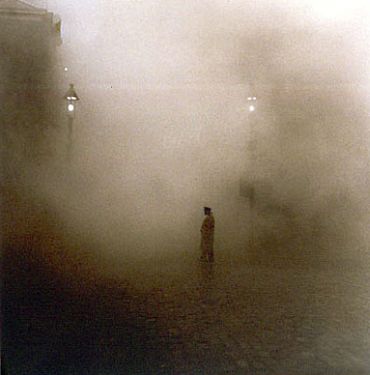 Barbara Mensch 1 2 3 interview
_______________________
H.D.’ s Crucible of Fire
Nancy Roche
jacket 38
In 1940, the poet H. D. was living at 49 Lowndes Square in London when the bombs started to fall. The period of time while the war raged around her proved to be prolific, a perfect confluence of events: the drama of living in war time, the after effects of psychoanalysis, and the practice of séance as channeled through an extensive knowledge of classical mythology. This convergence of internal and external dynamics at a particular moment in time, motivated her work, Trilogy. Hilda Doolittle, in all of her guises and various pseudonyms was trapped, and she was ecstatic.
Of this period, she would write:
Now exaltation rises like sap in a tree. I am happy. I am happier than I have ever been … we were able, night after night, to pass out of the unrealities and the chaos of night-battle and see clear. If my mind at those moments had any regret, it was that I might not be able to bear witness to the truth, I might be annihilated before I had time to bear witness.
This statement reveals much about the poet. She had a living spectacle right outside her windows, night after night in the streets. Also, she had a reason to live, a purpose, a mission. In this manner, H.D. would re-create herself as an incarnation of Hermes Trismegistus, the Egyptian scribe and poet, and the father of alchemy. Like the alchemist who combines exact materials at a particular time and flames them in the crucible to purify their essence, H. D. would frame her great mythological poem cycle from the elements around her, melded with aspects of her classical studies and travel. ...(more)
Jacket Feature: H.D.
_______________________

Fulton Street Fish Market
Barbara Mensch
_______________________
hell 1: the end of therapy
adswithoutproducts
... therapy, perhaps the most unnatural thing in the world, shares one trait with its verdant antagonist: it, too, abhors a vacuum. And so you dither around for a bit, wandering around the woods of your week of OKness, searching for half-hints of the older problems, the tailhook of crisis and fear. And of course, of course, eventually you find it and there you are back again conversationally reanimating the affective power of something that you’ve spent time and money and unpleasant thought neutralising.
Psychoanalysis, in this sense, suffers from the same infernal logic as narrative prose itself. Handke’s novel (On a Dark Night I Left My Silent House) stays stuck in housewandering routines of its pharmacist for a bravely long time…. But then something happens, a crash and then the arrival of the fantastic or the projective. It happens, according to the mandates of form – the mandate that time gets formed into instants and events laden with significance – just as my sessions dive away from the depredations of the quotidian and back to my childhood home, the evental break points of adolescence and afterward.
The memoir that therapy would coauthor will accommodate chaos in the present and of course the miserable, belated epiphanies of childhood. But it has no page space for the soft depredations of the static present, of thoughtless animal scavenge, of the softly catastrophic status-quo....(more)
_______________________

Pierrot Surprised
(1854)
Félix Nadar
Gaspard-Félix Tournachon
1820 - 1910
_______________________
Ismail & Turnavitu / Algazy & Grummer
Urmuz
Translated from the Romanian by Julian Semilian
exploring fictions
Algazy & Grummer
Translated from the Romanian by Julian Semilian
Algazy is a pleasant old man, gap toothed and grinny, with sparse and silky beard, neatly placed upon a gridiron screwed under the chin and hedged with barbed wire....
Algazy speaks no European language... But if you wait for him in the dawn of day, at the break of morn, and say to him: “What goez, Algazy!” dwelling on stressing the sound of Z, Algazy grins, and so as to manifest his gratitude, pushes his mitt in his pocket and yanks at the start of a string, prompting his beard to jump for joy an entire quarter of an hour... Unscrewed, the gridiron serves to resolve any quandary, pertinent to the harmony or hygiene of the home....
Algazy never accepts bribes. Once only he lowered himself to this mode of demeanor, when he was a copyist for the Church Notary, and even then he took no cash but only a few crock shards, eager to endow with dowry several of his indigent sisters who were about to become betrothed the very next day.......(more)
_______________________

having portrait taken
Pawela
c.1960
Faces
Charles A. Hartman Fine Art
_______________________
Kairos:
A Journal of Rhetoric, Technology, and Pedagogy
Issue 14.1 (Fall 2009)
_______________________
Under-Appreciated Novels
Robert Birnbaum
Before you are deluged with the press release parroting of what I hope are well-meaning literary journalists rushing to present you with the lists of forthcoming books for the fall season (as if you have come close to reading much of the last season’s list), let me offer a list of my own creation. Though it must be said—and I will say it—that book lists seem to me to only be useful for course or seminar preparation. Don’t you think?
A familiar aria amongst us reader/writer types is the anguished hand-wringing that accompanies intoning the cruelty and myopia of the rest of the barbarous world in failing to recognize the brilliance of that which we (meaning I) deem to be genius. I am not immune to such pedestrian foibles—and so, here’s my list of wonders. The only thing that they have in common (besides me) is that they were all read in this century....(more)
_______________________
Announcing: Conscientious Portfolio Competition
Jörg Colberg
_______________________

world watcher
Jack Spencer
1 2 3 4

Ship with pollard
Matthijs “Thijs” Maris
b. 17 August 1839
_______________________
Fencing Off Ideas:
Enclosure and the
Disappearance of the Public Domain
James Boyle
Sir Thomas More went further, though he used sheep rather than geese to make his point. He argued that enclosure was not merely unjust in itself, but harmful in its consequences. It was a cause of economic inequality, crime, and social dislocation.
Your sheep that were wont to be so meek and tame, and so small eaters, now, as I hear say, be become so great devourers and so wild, that they eat up, and swallow down the very men themselves. They consume, destroy, and devour whole fields, houses, and cities. For look in what parts of the realm doth grow the finest and therefore dearest wool, there noblemen and gentlemen...leave no ground for tillage, they enclose all into pastures; they throw down houses; they pluck down towns, and leave nothing standing, but only the church to be made a sheep-house. ... Therefore that one covetous and insatiable cormorant and very plague of his native country may compass about and enclose many thousand acres of ground together within one pale or hedge, the husbandmen be thrust out of their own.
The enclosure movement continues to draw our attention. It offers irresistible ironies about the two-edged sword of "respect for property" and lessons about the role of the state in making controversial, policy-laden decisions to define property rights in ways that subsequently come to seem both natural and neutral....(more)
via Gary Sauer-Thompson
_______________________
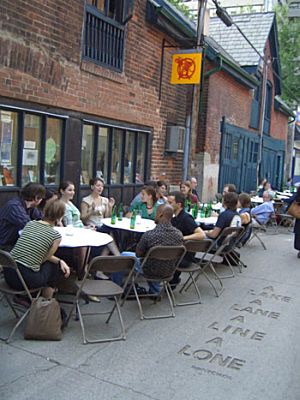
photo rick/simon
quill and quire
Tucked away on Toronto’s historic bpNichol Lane, Coach House Books has been publishing and printing high-quality innovative fiction and poetry since 1965. Coach House is Canada’s most venerable literary press and has, during the past forty years, published books by Michael Ondaatje, George Bowering, bpNichol, Nicole Brossard, Christian Bök, Guy Maddin, Steve McCaffery, Gail Scott, Jonathan Goldstein, Anne Michaels, Michael Redhill and hundreds of others. A refuge for the refined, an asylum for the aesthete, a sanctuary for the scribe.
Coach House buys its coach house
Coach House Press is purchasing its building! The historic coach house, located on bpNichol Lane (near the University of Toronto campus) and home to Coach House Books and Coach House Printing since 1968, has just been acquired by long-time tenant Coach House Press.
The press purchased two coach houses on bpNichol Lane - the buildings that house the editorial offices, printing operations and warehouse. As one of only three Canadian publishers to print on site, the Coach House is a popular spot during the Doors Open festival. Visitors can observe twin Heidelberg presses print up to 5,00o sheets an hour, explore cases of handset type, learn about the perfect-binding process and sit in the chair that has caressed the behinds of everyone from William S. Burroughs to Michael Ondaatje. Many important works of Canadian literature have traveled from the acquisition stage to the final trim under one roof (or, rather, two connected roofs).
To celebrate the new development, and to celebrate founder and Coach House owner Stan Bevington’s recent appointment to the Order of Canada, Coach House is holding a Wayzgoose Party on September 3, 2009. Historically, the Wayzgoose was an entertainment given by a master printer to his workmen each summer’s end (when the season of working by candlelight began). At the Wayzgoose Party, friends and readers can visit the Coach House, tour the premises, have a few drinks, eat some food, buy some books and mingle with authors, publishing figures and neighbourhood residents.
Come out on September third and celebrate the fabulous news! Coach House will present short speeches at 6 p.m. from some well-known fansand friends, and we’ll be throwing sausages and burgers (beef and veggie) on the barbecue at 6:30. The Wayzgoose Party runs from 5:00 until late at the Coach House (80 bpNichol Lane).
_______________________

Zhang Xiao
_______________________
Howl
William Rivers Pitt
If you've ever wondered what lurks at the very bottom of the American political barrel, look no further than the scenes that have been playing out in health care town hall forums across the nation over the last couple of weeks. (....)
This is what has become of the Republican Party in the 21st century. Those Gallup numbers appear on the surface to indicate the "protests" are having a positive effect for the GOP, but dig a little deeper and a different picture emerges: a solidifying of support among people who already support the Republicans. In other words, the GOP is once again rushing into the demented embrace of their base instead of trying to broaden their appeal.
The Republican Party is shrinking, and screaming as it does so. If these town hall "protests" are any indication, what we have is a GOP so demonstrably starved of ideas that all they have left is howling disruption and mindless noise. It may be effective in the short term, but it is yet another indication that the Republicans have little to offer the nation except sound, and fury, and nothing....(more)
_______________________
In America, Crazy Is a Preexisting Condition
Birthers, Town Hall Hecklers and the Return of Right-Wing Rage
Rick Perlstein
So the birthers, the anti-tax tea-partiers, the town hall hecklers -- these are "either" the genuine grass roots or evil conspirators staging scenes for YouTube? The quiver on the lips of the man pushing the wheelchair, the crazed risk of carrying a pistol around a president -- too heartfelt to be an act. The lockstep strangeness of the mad lies on the protesters' signs -- too uniform to be spontaneous. They are both. If you don't understand that any moment of genuine political change always produces both, you can't understand America, where the crazy tree blooms in every moment of liberal ascendancy, and where elites exploit the crazy for their own narrow interests. (....)
The tree of crazy is an ever-present aspect of America's flora. Only now, it's being watered by misguided he-said-she-said reporting and taking over the forest. Latest word is that the enlightened and mild provision in the draft legislation to help elderly people who want living wills -- the one hysterics turned into the "death panel" canard -- is losing favor, according to the Wall Street Journal, because of "complaints over the provision."
Good thing our leaders weren't so cowardly in 1964, or we would never have passed a civil rights bill -- because of complaints over the provisions in it that would enslave whites. ...(more)
_______________________
The Wrong Stuff
What we don’t know about how to correct misinformation
Greg Marx
Columbia Journalism Review
Once factually inaccurate ideas take hold in people's minds, there are no reliable strategies to dislodge them-especially from the minds of those for whom the misinformation is most ideologically convenient.(....)
Research suggests that even if a specific factual misunderstanding can be refuted, the judgment it facilitated is likely to remain. In other words, even if the idea that the government wants to create “death panels” is discredited, the suspicion of health care reform that the belief fostered will linger.
That’s discouraging news for Obama’s health reform ambitions—but it’s also pretty disheartening for the press, which counts as one of its core responsibilities the communication of accurate information about the world, with the expectation that that information will inform public debate. The media itself, of course, is often culpable in spreading misinformation. But if people, at a certain point, aren’t listening, are even good journalists—the skeptical, truth-telling sort, who challenge authority, check the claims they report, and speak truth to power—really communicating?...(more)
Misinformation and Outright LiesAric Mayer
The chief problem with this entire conversation lies in the fact that it still fails to completely deal with the economies within which journalists do their work. There are clear systems of financial rewards and penalties within the industry. The kinds of watchdog journalism that are advocated on CJR, and these are generally ones that I agree with, are not necessarily financially supported by the audience.
It seems likely to me that there are simply more people who want to consume media that reinforces their preconceptions than there are people who want to support a journalism industry that would be more neutral and therefore more confusing and less reassuring in its political orientation. But still, this is the work that has to be done. At least for a long enough time that a new market emerges as an alternative to the MSNBC vs Fox News climate that we consume today....(more)
_______________________
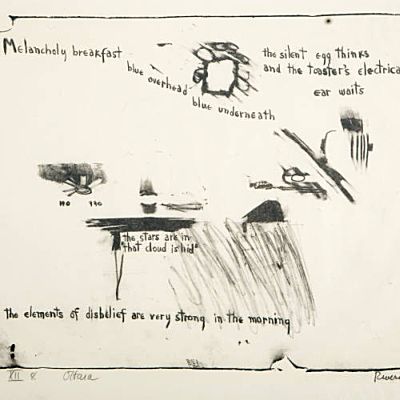 Larry Rivers and Frank O'Hara, Stones, 1958
Melancholy Breakfast
Frank O'Hara
Melancholy breakfast
blue overhead blue underneath
the silent egg thinks
and the toaster's electrical
ear waits
the stars are in
"that cloud is hid"
the elements of disbelief are
very strong in the morning
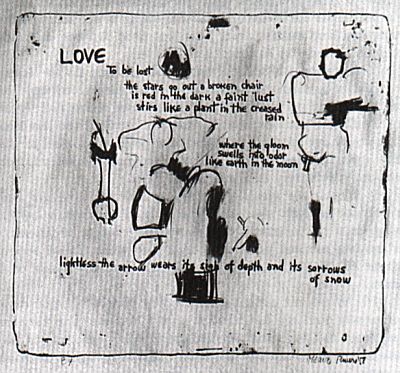 Larry Rivers and Frank O'Hara, Stones, 1958
Larry Rivers
(August 17, 1923 - August 14, 2002)
_______________________
Transformations
Journal of Media & Culture
Issue No. 17 2009
Bernard Stiegler and the Question of Technics
Transformation as an Ontological Imperative:
The [Human] Future According to Bernard Stiegler
Stephen Barker
The Cosmeceutical Face: Time-Fighting Technologies and the Archive
Grayson Cooke
The Duck and the Philosopher:
Rhythms of Editing and Thinking between Bernard Stiegler and The Ister
Patrick Crogan
_______________________

Europa I
Larry Rivers
1956
_______________________
The researchable researcher
decasia: critique of academic culture
... there are pitfalls in our digital presentations of self: this blog may yet cause troubles I haven’t thought of. But I would argue – against many of my shy and paranoid colleagues and classmates – that anthropologists have a major moral and logical obligation to make their profession and their academic praxis accessible to public scrutiny and engagement. I’ve met too many American academics who are afraid of being analyzed, who dismiss themselves as being “too boring” to study, who are happy to sweep all the dust and cruelty of the academy under the rug of a few highly stylized public presentations of their work. Any anthropologist who is a priori against an ethnographer studying their department has, in my view, no moral ground asking anyone to participate in ethnographic research. That would be the sheerest form of hypocrisy and one-way objectification. Again, this isn’t to say that everything can ever be completely public – see above – but just that ethnographers’ general obligation has to be towards openness and against a habitual retreat into the fantasy of a private academic world. Academic spaces are never as private as they seem, nor as pristine.
in response to John Jackson'sThe Presentation of Self in Ethnographic Life, Part 1 and 2
_______________________

Matthijs Maris
_______________________
Guarantee Against Panic
Robert Gibbons
The boat could have been going down, but she remained undistracted from the pages of her book. It's strange to feel the ground against a steel hull. It's ominous. The stones I heard sounded hungry. Her mere presence was a guarantee against panic. There is no difference between her serenity & the way a rose or a dahlia respond to the touch of sun turning to solid light & color on the stem of a body. Instead, passengers on board surrounded her with a sheer inscrutable vase cast out of the quandary of their own gaze.
Time on Water
a chapbook by Robert Gibbons drunkenboat
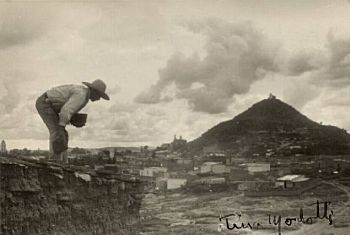 Man bending in front of hill
Tina Modotti
1926-1929
Shadows, fire, snow: the life of Tina Modotti
Patricia Albers google books
_______________________
Resisting Print:
Jack Spicer’s Lecturature
Graham Foust
jacket
When he read aloud from typewritten manuscripts, Spicer was prone to attacks of blindness, and it may be that he couldn’t see these almost fixed versions of his work precisely because he didn’t see his poems as fixable. He used his typewriter as an ashtray, a place for unwanted ends, and he more often than not let other people (like his friend and fellow poet Robert Duncan) do the typing. Spicer’s spook-guided and child-like hand gripped a pencil instead, thus both personalizing the work and distancing him from the fused means of production and distribution created by the typewriter. Deep in the age of print, an age of uniformity and perfection, Spicer asked that his publishers not correct the grammatical errors in his poems, and the unmistakability of his mistakes — what reader of Spicer’s Language can forget his “sylabbles”?—works against Martin Heidegger’s insistence that “The typewriter makes everyone look the same…” (qtd. in Kittler Gramophone 199).
With Spicer’s work in mind, we might do well to revisit Walter Ong’s notion of the printed word:
Print creates a sense of closure not only in literary works but also in analytic philosophical and scientific works. With print came the catechism and the “textbook,” less discursive and less disputatious than most previous presentations of a given academic subject. Catechisms and textbooks presented “facts” or their equivalents: memorizable, flat statements that told straightforwardly and inclusively how matters stood in a given field. By contrast, the memorable statements of oral cultures and of residually oral manuscript cultures tended to be of a proverbial sort, presenting not “facts” but rather reflections, often of a gnomic kind, inviting further reflection by the paradoxes they involved.
Those familiar with “A Textbook of Poetry” can certainly see that the numbered prose sections of Spicer’s serial poem are far from the closed circuit envisioned by Ong; to be sure, this is one of the most discursive and disputatious “textbooks” ever written. Moreover, those aware of Spicer’s method of composition will recognize that his poetic practice more closely resembles the residual orality that Ong ascribes to manuscript culture rather than the “secondary orality” of the postmodern era. While his poems are certainly applicable to what Peter Gizzi calls our “post-Desert Storm, Deep Space, X-Filed age,” Spicer’s small-group mentality, his taking of “dictation,” and his “glossing” of his poems all point to what might be called a “manuscriptive” poetics. As he states in his lecture on “Poetry and Politics”: “The idea of making things last is something which just has to be conquered”. ...(more)
_______________________

Santa Fe River, Canyon Road
Castillo Street Bridge, ca. 1912
T. Harmon Parkhurst Through the Lens - Creating Santa Fe
New Mexico is a photographers' paradise: the incandescent quality of the light, dramatic cloud formations, and expansive landscape have attracted photographers to our state since nearly the beginning of photographic history. From about 1850 to the present, photography has been used effectively to document, create, and promote Santa Fe.
Through the Lens: Creating Santa Fe is a visual history of Santa Fe, New Mexico — as it celebrates its 400th anniversary as the oldest capital city in North America. These images, selected from the collection of the Photo Archives at the Palace of the Governors and through studio visits with contemporary photographers, illuminate the multiple meanings of place.
via gmtPlus9 (-15)

Santa Fe Plaza
Jesse L. Nusbaum
ca. 1914
_______________________
The Collagist
online literature from Dzanc Books
Issue One
August 2009
Dzanc Books
via HTMLGIANT
_______________________
Now
Liam Rector
(November 21, 1949 - August 15, 2007)
(....)
Then, through no inherent virtue
Of one's own, but only because
The oldest ones are busy falling
Off the edge of the planet,
The years of governing,
Of being the dreaded authority
One's self; then the recognition
(Often requiring a stiff drink) that it
Will all soon be ending for one's self,
But not before Alzheimer's comes
For some, as Alzheimer's comes
For my father-in-law now (who
Has forgotten not only who
Shakespeare is but that he taught
Shakespeare for thirty years,
And who sings and dances amidst
The forgotten in the place
To which he's been taken); then
An ever-deepening sense of time
And how the end might really happen,
To really submit, bend, and go
(Raging against that night is really
An adolescent's idiot game).
...(more)
_______________________

Charles Bukowski
(August 16, 1920 – March 9, 1994)
_______________________
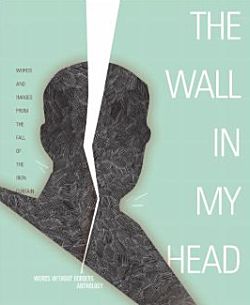
The Wall in My Head: Words and Images from the Fall of the Iron Curtain (GALLEY)
a Words Without Borders Anthology
Open Letter Books
viewable at Yudu
Combining work from the generation of writers and artists who witnessed the fall of the Iron Curtain first-hand with the impressions and reflections of those who grew up in its wake, THE WALL IN MY HEAD provides a unique view into the change, optimism, and confusion that came with 1989 and examines how each of these has weathered the twenty years since that fateful year. Highlights within include seminal excerpts from the work of Milan Kundera, Peter Schneider, Ryszard Kapus'cin'ski, Vladimir Sorokin, and Victor Pelevin, and new work from Péter Esterházy, Andrzej Stasiuk, Muharem Bazdulj, Maxim Trudolubov, Dorota Mas?owska, Uwe Tellkamp, Dan Sociu, David Zábranský, Christhard Läpple, and a host of others.
_______________________
From The Ancient Use of Stone
Ray DiPalma
Green Integer Review
February 12 Not veneer—heartwood. Descriptive signatures. The purely descriptive spoken at the demonstrable. Sayable, therefore of secondary importance. An exclusionary perspective shaped by what has been brought about and turned to.
Savoring a lack of emphasis, while misunderstanding any progressing aspect of a possibility. Misdirection. As discoverable by . . . Beyond assent. This will be set out by what has been set upon. The aggressions of form. Beyond suggestion or shared
regulative assent within the congering subtleties of paradigm.
(....)
In a crude box of stone. Ostensives. Bones.
The materials: an observable legacy.
The simplest and the most problematic.
A portion of distance the water embossed.
Pauses or deletions in the text: ainos (story) & ainigma
“. . . an abstract unity . . .” [Baudelaire]:
and the unapproachable distance.
“All research on the labyrinth ought properly to begin with the dance.” [Kerenyi]
An inevitable order in the world
Compels silence
Not an outcome but a simulacrum
Of its rhythm
...(more)
More from The Ancient Use of Stone
.....................................................
The Ancient Use Of Stone: Journals And Daybooks, 1998-2008
Ray Dipalma
Otis Books/Seismicity Editions
(Distributed by SPD)
A review by Nick Piombino (fait accompli )
While contemporary poets and critics opine and debate about whether or not originality is still possible, contemporary poet Ray DiPalma has been quietly at work on a project for 10 years that demonstrates that not only is creativity and originality by poets alive and well, but Otis Books/Seismicity Editions, has presented the ancient use of stone, Dipalma's superb new book, subtitled Journals and Daybooks, 1998-2008 in a form that defies comparison with any other book of new writing for sheer visual and typographical beauty....(more)
_______________________

Tepotzotlan, Semana Santo
[Edward Weston in window]
Tina Modotti
1924 1 2 3
_______________________
Paths to iDeath
Vincent Dussol
There is a delicate balance in iDEATH. It suits us.
(Richard Brautigan In Watermelon Sugar)
An autobiography is about an “I” and it traces a path. But the “I” and teleology have long been called into question by poets. This interrogation continues: wanderers blaze new trails. We propose to examine some very recent ones. For the “I” does not die of course. Incidentally, writings by poets about approaching death show “I” ’s reaching out to others for amplification and enrichment, a supplement of overtones: “autobiography” it remains to the end then. The coinage of its purported opposite—“autothanatography”—therefore seems unnecessary as it might well label an empty category.
(....)
“August 9, 2005 (…) Given rapid and persistent cellular change are you yourself? Now? Now? How about now? And now?” (Ray DiPalma An August Daybook). DiPalma was at the cutting edge of experimental writing right from the late 1960s. Epistemological suspicion of transparency and referentiality, of taken-for-granted essences had been reaching a peak. With DiPalma’s earlier work, the notion that one might even provide a whole version of one’s self is self-evidently ruled out (with a Poundian nod to Dante, however):
Finally he gets lost in a forest moving himself for-
ward with facial gestures.
Deaf knew altogether I’m in my silence perplexed
tuners being none himself myself dismiss a term
of prevalence a prevalent term. One and the same
thing.
I am naked to its furthest limits as a result. Sustain
its legs however for the little matter of its logical
possibilities. (“Scales” Soli 2)
(....)
Experimentalists will often relent with the passing of time. DiPalma has stood firm in his non-militant but obvious commitment to writing that stays free of the romance of the personal. His river path has been one of words: in the recent “Paving the River,” an anonymous speaker is probably reiterating the stance of the one sounding through him:
Substantiation only an afterthought—
This is the story—or pieces of it--
still enough in the voice to hold them together--
the traction in the saying and the apprehension
of all that remains hidden in the awareness of these pages
lost
What is memory but an attribute
of negligence and confused priorities, blunders,
and wrong turns--
First find the music
following your own steps to its source
and only then with efficient empathy
turn to the blank page with what ink remains in the pen
--not with some blur of endeavour sanctioned by
a misguided sense of purpose appropriated from an earlier
inhabitant of the same illusory space— (Caper 27).
...(more)
E-reaRevue électronique d’études sur le monde anglophone
Poetry and Autobiography
_______________________

Tina Modotti
(August 16 (or 17) 1896 – January 5, 1942)
photo by Edward Weston
1924
_______________________
Thinking between disciplines: an aesthetics of knowledge [pdf]
Jacques Rancière
Translated by Jon Roffe
Parrhesia
The thesis that I would like to present is simple: to speak of an aesthetic dimension of knowledge is to speak of a dimension of ignorance which divides the idea and the practise of knowledge themselves.(....)
Disciplinary thought says: we have our territory, our objects and the methods which correspond to them. This is what sociology or history, political science or literary theory, says. This is also what philosophy, in the regular sense, says, posing itself as a discipline. But at the moment in which it wants to found its status as a discipline of disciplines, it produces this reversal: the foundation of foundation is a story. And philosophy says to those knowledges [savoir] who are certain of their methods: methods are recounted stories. This does not mean that they are null and void. It means that they are weapons in a war; they are not tools which facilitate the examination of a territory but weapons which serve to establish its always uncertain boundary.
There is no assured boundary separating the territory of sociology from that of philosophy or that of the historians from literature. No well-defined boundary separates the discourse of the woodworker who is the object of science from the discourse of science itself. After all is said and done, to trace these boundaries is to trace the boundary between those who have thought through this question and those who have not. This boundary is never traced other than in the form of a story. Only the language of stories can trace the boundary, forcing the aporia of the absence of final reason from the reasons of the disciplines.
|
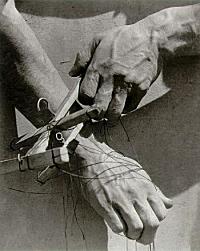
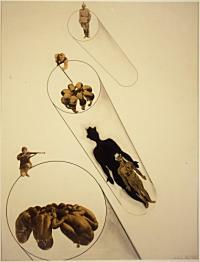
 Janus Head
Janus Head

 The Age of Briggs & Stratton
The Age of Briggs & Stratton


















.jpg)




















































